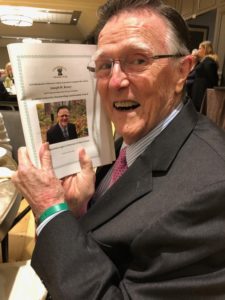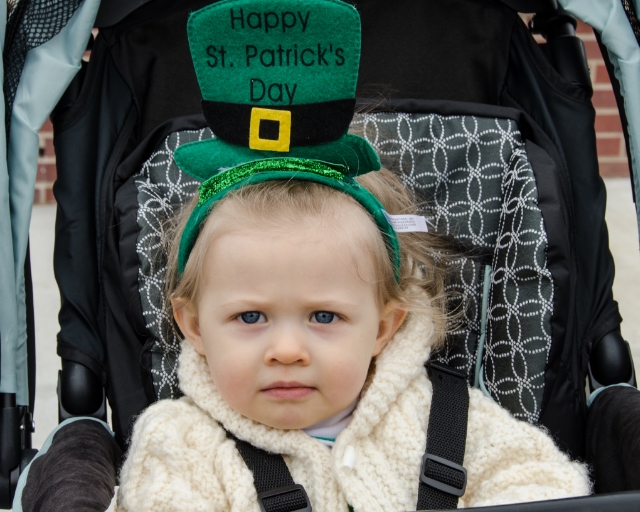Irish musicians throughout the world are familiar with the music of Philadelphia’s Ed Reavy. That so many know his work is largely a tribute to his son, Joseph M. Reavy, 91, recipient of Mid-Atlantic Comhaltas Ceoltóirí Éireann’s Gradam Comaoine/Outstanding Contribution Award, conferred June 8 at the 2019 Mid-Atlantic Region’s Hall of Fame Banquet. It was Joe Reavy—a talented multi-instrumental musician in his own right—who collected and transcribed his father’s many tunes into a thick book of sheet music.
He is characteristically self-effacing when he talks about the project.
“I don’t want to put myself in the forefront,” he says. “This is my father’s music. I published it so people would know it. He had an unbelievable musical memory, but my father did not write out the music. Of course, I read music and so I did most of the work, unless it was very, very technical stuff, and then I would call on someone else to help with it. Musicians—especially among advocates and people who loved his music—welcomed this (compilation) because they could put it in front of other musicians who maybe didn’t know too much about Irish music. I spent two years’ time with my father; almost every week we worked on it.
“It was just wonderful working with him. I learned so much. Even though he didn’t know how to write out the music, he knew how to talk about music. He had the greatest memory for tunes.”
Born September 21, 1927, Joe Reavy grew up in a neighborhood of Southwest Philadelphia known as Corktown, in St. Agatha’s parish. It was an area largely populated by Irish emigres. He was a middle child of six children, four boys and two girls. His mother’s name was Delia (nee Morley). “I loved her more than life,” he recalls. (As an aside, Ed Reavy’s mother’s maiden name was Hamill—the origin of one of Reavy’s most famous tunes, “House of Hamill.”)
Joe Reavy grew up in an environment surrounded by love. Although his father, of course, is better known, he recalls his mother with particular fondness. “She was,” he says, “the greatest influence on my life.”
Delia was born in County Mayo. Her father spoke Irish Gaelic throughout his life and passed along his love of the Irish language to his daughter—who in turn passed it along to her son Joe.
“She gave me the language very early,” he recalls, “and I spoke a lot of Gaelic.” Among the more useful words and phrases, he says with a gentle laugh, were a few useful curse words.
His mother, Joe Reavy recalls, was just brilliant. She ran her husband’s plumbing business and possessed a steel-trap memory. Once lodged in her brain, the memory never escaped. “Dad always put her on the phone when he had a problem,” he says. “Dad wouldn’t say much. When it was all over, he would just say, ‘That’s my Delia.’”
Irish music was also central to his life back then, certainly, and he recalls neighborhood sessions dominated by great fiddlers, with his father at the center.
Like Joe’s mother, Ed Reavy had a pretty fair memory, too, when it came to music. He recalls a time when, during a session, Ed started playing a tune that no one else in the room could recall. They asked when and where he learned it.
“’I hadn’t played that tune in 25 years,’” Joe can recall his father saying. “He said, ‘There are just certain tunes that came to me and I never forgot them.’ That’s the kind of head that he had.”
All in all, it was a perfectly fertile environment for someone who, like his father, played fiddle, and later classical violin. “It was a great childhood,” he recalls. “I loved it. I don’t know if I would have become a musician if I wasn’t totally taken with Irish music.”
Joe says he was also influenced to pursue music as a career as far back as elementary school. “We had really good music people, and that gave me a great start.”
Another strong later influence: American music, including the Dorseys and other big band stars of that era.
He went on to learn and play several other instruments, including banjo, mandolin and guitar.
Joe carried his love of music into later life. He attended Catholic University, playing first violin in the symphony orchestra, and later became a high school college counselor, teaching music on the side and assisting the high school music director.
Never one to let the grass grow under his feet, he has recently wrapped up production of a CD of his own work, called “Reavy’s Ireland”—poems by Irish authors set to music which he wrote, together with a book talking about the poems’ meaning. The CD is lavishly illustrated by a friend, John Gibson. The cover is a painting of Ed Reavy.
Joe Reavy looks upon that CD as important to his legacy. It is heavily influenced by memories of his father’s music. He discovered that much of the Irish poetry he loved was metrically similar to the structure of his father’s tunes. Here again, though, his mother was also an influence. “From the time I was a kid, I enjoyed poetry because my mother used to recite Irish poems,” he says.
Looking back, he is grateful for his musical and literary heritage, and for his upbringing—and for being in the right place at the right time to have preserved some of Irish music’s most treasured tunes. He smiles and says, “It’s been a great run.”



